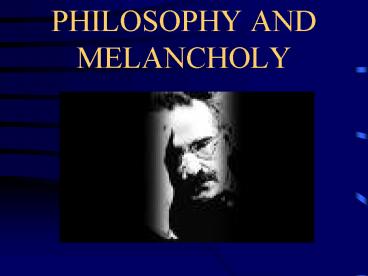PHILOSOPHY AND MELANCHOLY - PowerPoint PPT Presentation
1 / 20
Title:
PHILOSOPHY AND MELANCHOLY
Description:
PHILOSOPHY AND MELANCHOLY. PRISMATIC THINKING. To what extent ... ANGELUS NOVUS 'A Klee painting named Angelus Novus' shows an angel looking as though he is ... – PowerPoint PPT presentation
Number of Views:126
Avg rating:3.0/5.0
Title: PHILOSOPHY AND MELANCHOLY
1
PHILOSOPHY AND MELANCHOLY
2
- PRISMATIC THINKING
- To what extent does Benjamin matches
experiences and reflections? - 2. ARCADES AND REPRODUCTIONS
- What is Benjamins aesthetical project?
- 3. MEMORY AND SADNESS
- How to deal with lost time?
3
1. PRISMATIC THINKING
4
WALTER BENJAMIN
BIOGRAPHICAL NOTIONS 26 July 1892 born in
Berlin. 1902-1912 secondary school. 1912-1915
study of philosophy in Freiburg and Berlin. 1914
president of student association. 1915-1917
study of philosophy in Munich and becomes friend
of Gerhard Scholem. 1917 marriage with Dora
Pollak. 1918 birth of his son Stefan becomes
friend of Erns Bloch. 1919 Ph.D. Cum
laude. 1924 in love with Asja Lacis. 1925
couldnt defend his habilitation thesis. 1929
co-operation with Bertolt Brecht. 1933 starts to
work for the Institute of Social Research. 1938
as stateless person incarcerated by the
French.. 27 September 1940 death.
5
IMPORTANT PUBLICATIONS
- Critique of Violence (1921).
- Goethes Elective Affinities (1922).
- The Origin of German Tragic Drama (1928).
- One Way Street (1928).
- The Work of Art in the Age of Mechanical
Reproduction (1936). - The Paris of the Second Empire in Baudelaire
(1938). - On the Concept of History/Theses on the
Philosophy of History (1939 published
posthumously). - The Arcades Project (unfinished and published
posthumously).
6
FRANKFURTER SCHULE
- Institut für Sozialforschung gt founded in 1923
by Felix Weil - Interdisciplinary research program
- History of the labour movement
- Studying the socio-economical, psychological and
cultural factors to explain why people submit
themselves to authoritarian regimes.
7
(No Transcript)
8
PHILOSOPHICAL STYLE
- Essay.
- Different kinds of intellectual activities
(essay, translations, radio-programmes). - Combination of marxism and Jewish mysticism.
- Prismatic thinking gt correspondence between micro
cosmos and macro cosmos. - Dialectical imagination gt the importance of
experiences.
9
HEURISTIC VALUE
- Literature (Bertolt Brecht).
- Philosophy (Adorno).
- Media studies (Seel).
- Literary studies (George Steiner).
- Art (Dani Karavan).
- Theology (Gershom Scholem).
10
2. ARCADES AND REPRODUCTIONS
11
THE ARCADES PROJECT
- Passagenwerk Benjamin started this project
already in the twenties. - Analysis of the city life of Paris in the 19th
century. - The inner-outer world of the arcades mirror the
world at large.
12
THE LOST AURA
- The world of art changed because of modern
reproduction techniques. - Examples photography and film.
- Traditional art lost its aura.
- Aura gt the manifestation of the uniqueness of a
piece of art. - Modern art lacking the aura of the original.
13
AESTHECIZED POLITICS
- The relation between art and policitics changed.
- The differentiation of cultural spheres art,
morality and science. - Shift in the relation between art and politics.
- Politics gt dedifferentiation.
- All efforts to render politics aesthetic leads
to one thing war.
14
3. MEMORY AND SADNESS
15
MARCEL PROUS (1871-1922)
- In Search of Lost Time.
- Walter Benjamin translated parts of this work
together with Frans Hessel. - Important for his concept of memory.
- Two kinds of memories
- 1. Forced memory.
- 2. Spontaneous memory.
16
ADVENTURE AND EXPERIENCE
- Adventure (Erlebnis) gt that what an actor can
controle. - Experience (Erfahrung) gt that what cannot be
controled. - Experience is repressed by adventure.
- The replacement of the story by the information.
17
ANGELUS NOVUS
- A Klee painting named Angelus Novus shows an
angel looking as though he is about to move away
from something he is fixedly contemplating. His
eyes are staring, his mouth is open, his wings
are spread. This is how one pictures the angel of
history. His face is turned toward the past.
Where we perceive a chain of events, he sees one
single catastrophe which keeps piling wreckage
and hurls it in front of his feet. The angel
would like to stay, awaken the dead, and make
whole what has been smashed. But a storm is
blowing in from Paradise it has got caught in
his wings with such a violence that the angel can
no longer close them. The storm irresistibly
propels him into the future to which his back is
turned, while the pile of debris before him grows
skyward. This storm is what we call progress.
18
MEMORIAL POLITICS
- Central question which responsibility do we have
towards the suffering of others. - Eingedenken gt role taking concerning those who
are marginalized in society. - Criticism gt 1) making someone conscious about
something and 2) saving something. - Sadness is triggered by memorial politics.
19
MELANCHOLY
- Melancholia (from Greek melancholia) gt a
non-specific form of sadness. - History gt caused by an imbalance between one of
the four humours (bodily fluids). - Benjamin gt analysis of the German Tragic Drama.
20
It is more arduous to honour the memory of the
nameless than that of the renowned. Historical
construction is devoted to the memory of the
nameless.































